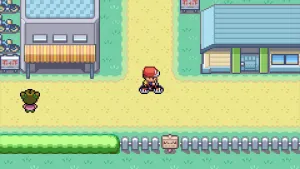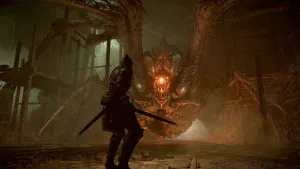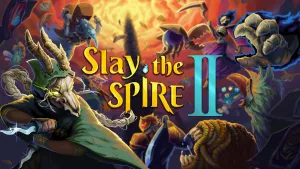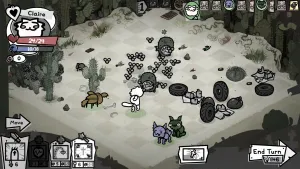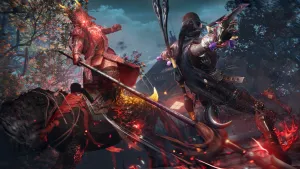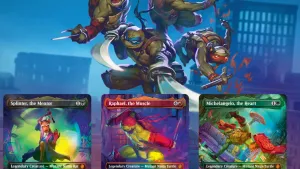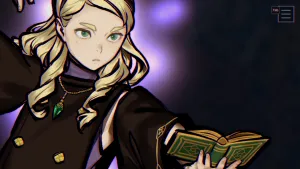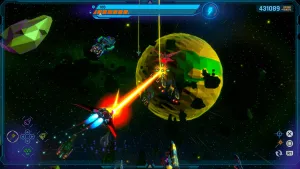The Oddworld Game That Never Was: The Brutal Ballad of Fangus Klot
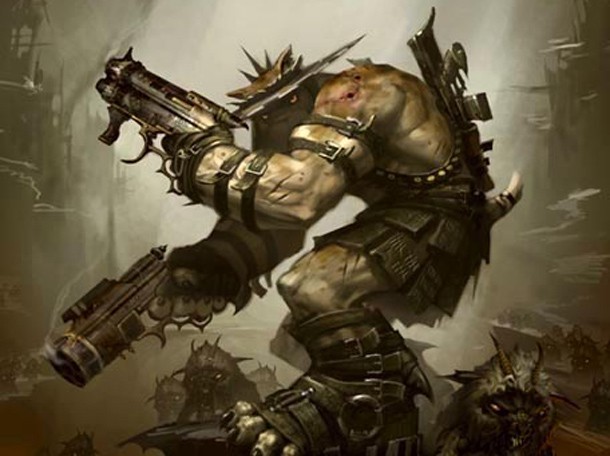
In April of 2005, Game Informer announced Oddworld Inhabitants’ newest game: The Brutal Ballad of Fangus Klot. However, just as the issue left for the printers, Oddworld Inhabitants abruptly shut down production and closed its doors. The development studio had long pleased fans with creative and humorous titles such as Abe’s Oddysee and Stranger’s Wrath, often weaving smart social commentary throughout its storylines. Fangus Klot looked to be its most ambitious venture; it featured a darker tone, a more intense combat system, and was poised to take on real-world issues still relevant today. So why did its developer suddenly put the game on the shelf? Oddworld mastermind Lorne Lanning answered our questions about the lost Oddworld title, the trouble with publishers, and the future of gaming.
[Story originally appeared in Game Informer Issue 194]
What was the original idea behind Fangus Klot?
We wanted to explore some other territories of Oddworld. We had always created this idea of a planet that multiple things can take place on, multiple possibilities. On Earth we can have Eskimos on one continent, on another we have tribes in Africa, and in others there are New York City and Tokyo. All these different worlds exist on one world. So we wanted to head somewhere radically different from the Oddworld characters we knew, move away from the quirky edge, and take things somewhere more hardcore.
What we were inspired by at the time – I was watching these documentaries of these Russian cities that were basically prison cities, which were discovered after the Cold War. These cities were built in this Siberian climate or a mining area, and there would be 10 million living in the city. Everyone was a prisoner. They would build these prison cities to become sort of their own economy. They had their systems of justice, but if you were in that city, you were basically a prisoner. You didn’t get to leave that city. What blew us away was the idea that there would be entire territories that were basically imprisoned.
At the same time we wanted to play with another dynamic, the timeless mythical battle between cats and dogs – immortal, timeless enemies forever. In a general sense, Oddworld had these Homosapien-like creatures that had evolved out of dogs and cats. They’ve become intelligent, become strong, and built civilizations, but the timeless battle of cats and dogs still existed. The hatred between them was still to the bone. It’s kind of like Oddworld’s version of Palestine and Israel.
We wanted it to be really hardcore. When I say cats and dogs it sounds kind of light-hearted, but that’s not what we wanted, and I think the cover of Fangus Klot illustrates that. We wanted to take Stranger’s engine and basically re-skin something more hardcore, not have live ammo, and just be like, “Here’s a guy fighting for his life, for his people, for his territory, and the escape of his land being taken over.”
Sounds like you guys invested a lot into the game’s history.
Yeah, the idea of what is happening here – this canine-ish race had been like sheepherders. They’d been closer to the land, a little bit more aboriginal. Think of them a bit like – not so much Native American – but very indigenous in that respect. Very close to the Earth. Herdsman. They were nomadic. They moved with their herds.
Whereas with this other race – the cats – we were fascinated about playing with this idea of the Russian mafia. This post-war, Russian intelligence gone rogue into mafia and criminal behavior. Fangus Klot was a nomadic herdsman who had a huge flock, but that was his previous life. His country had since been invaded by this Russian mafia – this cat race.
If you think about all the Oddworld voices and stuff, imagine hardcore gameplay, but when you come around corners and surprise one of these heavily armed feline-evolved characters, you hear this “Hssssss! Rwaaar!” The cat noises would be intertwined with their language – barking, growling, hissing – and that timeless hatred we would encapsulate with Russian mafia sensibility where they basically took over this entire territory and enslaved it. They were setting up these catnip labs, which for them were kind of like meth labs.
So the main character, Fangus, became a slave to this new government?
Well, they were making fodder out of those who lived on this land before. If you remember New Jack City, it was kind of like that. His people were in the labs, but others, like Fangus, were relegated to pit fighting for entertainment. It’s kind of like gladiators for a post-Soviet era of collapse and corruption of unimaginable magnitudes.
I wanted to have this really dark tone of industrial civilization coming into what was basically – almost like Afghanistan has been in tradition. For thousands of years it lived the same way, it had sheepherders, crop growers and things like that. Then all of a sudden it turns into this whole other country, which is illicit drug trade and hardcore bastards that couldn’t give a s--- about anything but themselves.
That is the theme of Fangus Klot. As the later designs started coming in, we started giving the design team more latitude with the project, and the team wanted to go more humanoid. We started seeing designs that were coming out that way. At that point, I thought if we continued in that direction, it wouldn’t be on Oddworld. It would become its own place. If [our characters] were going to start looking like bald humans then it would not be an Oddworld game. It would be somewhere else, not even in the Oddworld universe. In some ways, it held less appeal for me that way.
FLOCKING AROUND
Fans of Stranger’s Wrath might be interested to know that living ammo – the mechanic that gave the game such a unique flavor – wasn’t going to return in Fangus. In its place, Oddword Inhabitants was developing a herd management system. Fangus would control a flock of ravenous sheep-like creatures to take down enemies and solve puzzles. Destructible environments also played a large part of the now defunct gameplay.

When did you decide to make this the team’s game? When did you finally hand it over to them and let go of the reins?
We knew they wanted the game from the beginning, and so I started to shape it into a big package for them. But then it was like: we wanted to give them more freedom, but at the same time they thought, “Well, I don’t know. Cats and dogs kind of sounds childish.” You know, when you want to do something really innovative and creative, most people are not going to get it. So you have to bake it up to a certain point before they start going, “Oh! That’s why it’s going to be cool and not childish.”
The team that was working on it basically wanted to, in my opinion, just use all the Stranger mechanics to make a more traditional shooter. In some ways, the company was a little split – not in terms of intent – but we said, “Okay, if you guys want to do what you want to do, that’s fine, but it’s not going to take place on Oddworld, and you’ll have more creative freedom that way. Go ahead and run with this project.” That’s where it was eventually headed.
Was the game’s attention to politics in response to the cultural climate of the time?
Yes. Always. To me that’s the purpose. I don’t feel like, “Let’s go blow stuff up,” if it doesn’t have a purpose. Our world has enough problems, and when we do that – although it may be fun – it sort of furthers the psyche that we can just go blow the s--- out of people as long as we have a good enough excuse. I don’t believe that personally. So from my design of sensibility, I’m always interested in shining a light on the dark side of human behavior. The reason is so that we can see it coming.
For me, it’s always about creating entertainment that is more nutritious to the mind, the psyche, and our general awareness in life. If it’s not about that – to a large degree – I haven’t been interested. I don’t slam people that are just about making games that are fun; I love those games, too. I played Doom to death when it came out. I played Halo to death. I love those games. I’m thrilled that people make them, but for me it’s about something else as well.
To me, I believed for a long time, it’s up to the storytellers; it’s up to the news makers to help show us the truth, to help inspire us to do the right things because it’s not going to come in the form of traditional packaged entertainment. But when someone looks at it and says, “You know what? There’s no reason why we can’t make a movie that makes a lot of money and have it really make us more sensitive beings, more aware beings, more intelligent beings.” As storytellers, as myth makers, it’s our genetic role to try and create content that inspires people out of the dark times they face and to be something better.
OddWorld started as a goofy franchise, but over time it seemed – especially with Stranger – that the stories got darker and more serious. With Fangus, you had even said it was going to be darker than Stranger. Why that trend?
Because that was the trend in the market. In 1994 when we started building Abe, the number one game property was not Grand Theft Auto. It was Mario. The other big success was Sonic. We had to design to a limited resolution, limited computing power. Things still needed – for lack of a better word – a more cartoony design so they read better as graphics moving on the screen.
When we started with Abe – at that time, one of the most gratifying games I had ever played was Flashback – there was this idea of trying to capture something other than just 3D frenetic play. I was thinking I wanted to capture more storytelling. It still seemed very viable in the day, and so at that time it seemed appropriate that the gaming age was largely a younger skew.
Just look back – how much controversy surrounded Mortal Kombat? It was huge. Why? Because those cartoony-looking characters, those 16-bit characters were getting their spines ripped off and being decapitated. “Oh my gosh, this is the end of the civilized world!” Well, look at where we’re at now. That stuff’s happening in almost every game out there, so it’s not so much an issue anymore. The shock value is gone. We could say we are desensitized, that that’s the norm. The appetite of gamers is changing rapidly.
With Stranger’s Wrath you guys were working with EA. When you started work on Fangus you switched over to Majesco Entertainment. Why the switch?
With EA, personally, we found the situation unworkable. We found that if the publishers don’t own your IP, they don’t have any incentive to push your game. Stranger was a big game, it was an expensive game, and it was a really hard game to build. But what we didn’t realize is that since the publisher didn’t own it, they weren’t going to support it on the marketplace. That has totally changed my thinking on how you should approach a game.
We could build a game like that, and they could make the choice to support it the way that they did. That’s not a business relationship. That’s a master-slave relationship – one that we had no interest in continuing. So we were willing to test the waters with some other publishers, and we got started on Fangus when another pattern crept in. This made our final decision to basically shut down the studio on the central coast.
What was that other pattern?
I have to be careful about how I say this stuff, because the gamer hears it one way, but game developers know exactly what I am talking about. Publishers use your own company against you because they know that you have a burn rate. They know that this is your family of kids that you need to feed every month. So if they make a deal with you, then they realize, “Oh, you know what? We should have done this thing in that deal, too,” They might start playing games with you.
I’ll give you a hypothetical situation: “Oh, we’re having some accounting issues, the checks are a little late, but they’ll be coming. We’re sorry for the delay, but you know what? There’s this other thing in the contract we’d like to renegotiate. We realized after we made the deal that we really would like to have some different terms on that.” And then you find that your check is not showing up because they want to renegotiate.
That’s holding your own company as a gun to your head and going, “If you want to pay your people, you keep on doing anything we say no matter how unreasonable it is, and if that’s a situation you can’t win, then too bad because we’ll win. We’re the ones with the gold and gold rules.”

It almost sounds like the Russian mafia.
[Laughs] Maybe it’s not that diabolical, but I think it comes more out of incompetence than deviousness. I’m not saying that this is the evil intent out there, but it is the common behavior. There are some slime balls in the industry that have done some slimy things, but as far as industries go, this industry is good about being authentic. It’s pretty decent. It’s not nearly as ugly as the music business or as one-sided as the film business. There’s good things and bad things about the industry. But incompetence is really big in this industry. We’re talking about a huge industry that, even in this global financial crisis, is still showing growth, one of the only sectors still showing growth. That’s huge, but it was only 20 years ago that this industry was in garages – not in big companies.
It seemed like the hammer came down pretty quickly. Only a month after announcing Fangus the studio was closing down.
Yeah, we had every intention of building the game, and then the shenanigans started, so we just said, “We’re not going to play this game. If that’s how you want to play, then we’ll go play with someone else. We’re going to take our ball and go home.” Because what I saw, down the road, eventually our IP would wind up hostilely acquired by people who cared less about it. In many ways, while Oddworld has been sitting on the shelf, it is still something we have a huge belief in. So we’re not willing to compromise that belief.
So in Fangus, while we were still excited about it, while we were still building it, I would say it this way: Sometimes developers get fired by publishers and sometimes developers fire publishers – and that’s probably all I should say about it.
Do you think, since you guys still own the property, that you’ll ever go back and revisit Fangus Klot? At some point, will you ever try to make that game or one like it?
Well, what we’ve done is put our games up on Steam – the first two Abe games. We have a lot of interest in seeing how the digital distribution mechanism really works. I’ve got to tell you, we were blown away. For the first time, we’re able to tell where our sales were coming from, how many dollars we were making per day. What territories sold better last night than the night before – was it Eastern Europe, was it Southeast Asia? We’re able to see it all. We never got to know who our customer was before.
So, if you go back to Fangus Klot, you’ll sell it through digital distribution?
Yes, but we are not focused on doing story games in that way anymore. That doesn’t mean that we wouldn’t license the property to another developer who does very good story games. But we’re aiming for a different type of chemistry all together. We’re looking more at where social gaming and networking is colliding. We’re looking more at free-to-play item sales rather than $60 of product.
A gamer buys a game, and a gamer spends $50 on that game. If they didn’t like it, that was a big output for something that they didn’t like. I believe the future of gaming is going to be based more on usage – it’s more like our electrical bill. At our house we only pay for what we use.
If I give gamers something that’s free to play, they can get engaged – that’s like the free demo, right? But if they want to get more engaged, then they start micro-paying, so they might find after $10 into the experience, they’ve gotten plenty, and that was enough and that was fine. It didn’t cost them much to have that experience.
Our focus is not to build big, long story games. Our focus is to build a really rich mythos where people get to engage in their own narrative, and that sounds abstract – I can’t say much more about it, but that’s where we believe things are heading. So the idea of building another Stranger, for us personally, is not even on our radar. It’s a whole different chemistry coming. And that’s what we’re interested in.
STORY IN SHORT
The game’s original story revolved around a sheepherder named Fangus who was enslaved after his land was seized by an invading government. After years of brutal gladiatorial combat, he escaped a much colder and angrier beast. The game detailed his pursuit to seek vengeance on his captures and lead a revolt. Unfortunately, he had to work fast as a rabies virus slowly consumed his body.















Get the Game Informer Print Edition!
Explore your favorite games in premium print format, delivered to your door.
- 10 issues per year
- Only $4.80 per issue
- Full digital magazine archive access
- Since 1991
